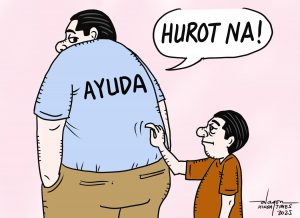 BY LUCKY CIMATU
BY LUCKY CIMATU
IT IS said that global shifts, movements, and issues know no borders; what happens in one part of the world can impact us all.
The game is changing on the other side of the world, and these shifts are poised to disrupt our current supply chain operations here in the Philippines. You may wonder how and why these changes affect the Philippines, but it’s crucial to recognize the far-reaching impacts of international regulations. Particularly, those from influential regions like the European Union (EU). With sustainability as a current core focus in the EU, we can expect significant disruptions and shifts in the sustainability landscape.
One prominent example of these regulatory changes is the EU Deforestation-Free Regulation (EUDR).
The EUDR is not the only regulation likely to impact businesses in the Philippines, but it is a significant indicator of the growing global emphasis on sustainability. Businesses must start embedding these principles into their operations now to stay ahead.
Understanding some of the Key Features of EU Deforestation-free Regulation (EUDR)
- Products Included in the Regulation
The EUDR targets seven key commodities: palm oil, cattle, soy, coffee, cocoa, timber, and rubber, along with their derived products, such as beef, furniture, and chocolate. These commodities were chosen based on a thorough Impact Assessment identifying them as the primary drivers of deforestation due to agricultural expansion.
This assessment utilized scientific data and previous research to identify commodities through which European consumption significantly contributes to global deforestation and forest degradation.
The EUDR applies equally to products from within and outside the EU.
- Objectives
The new rules aim to:
- Prevent the listed products that Europeans buy, use, and consume from contributing to deforestation and forest degradation globally and within the EU.
- Reduce carbon emissions caused by EU consumption and production of these commodities by at least 32 million metric tonnes annually.
- Address all deforestation driven by agricultural expansion for the production of commodities within the regulation’s scope, as well as forest degradation.
Furthermore, the EUDR requires companies trading in cattle, cocoa, coffee, oil palm, rubber, soy, and wood, along with derived products, to conduct thorough due diligence on their value chains. This ensures that goods do not result from recent deforestation, forest degradation, or violations of local environmental and social laws. Companies should assess the EUDR’s impact on their supply chain due diligence now to prepare for new obligations effective December 30, 2024.
- Non-Compliance Excludes EU Market Access
From December 30, 2024 (or June 30, 2025, for micro or small businesses), it will be prohibited to place relevant products on the EU market or export them from the EU unless they are deforestation-free, produced in accordance with relevant legislation, and accompanied by a due diligence statement indicating negligible risk of non-compliance.
- Compliance with Local Social and Environmental Laws
Products must be produced in accordance with the relevant legislation of the production area, covering land use rights, environmental protection, forest-related rules, third-party rights, labor rights, human rights, and other regulations.
- Primary Responsibility for EU Market Companies
Companies placing products on the EU market must upload a due diligence statement to their national authority, assuming responsibility for compliance. Non-EU companies may need to provide the necessary information to comply with due diligence obligations.
- Penalties for Non-Compliance
Penalties may include fines up to 4% of the company’s EU turnover, confiscation, or exclusion from public funding or contracts. Criminal penalties may also be implemented in the future.
Impact on Philippine Businesses
For businesses in the Philippines, the EUDR will have significant implications. Many Philippine exports, particularly agricultural products like palm oil, coffee, and rubber, are included in the EUDR’s scope. Compliance with these regulations will be mandatory for access to the EU market, a major destination for Philippine exports.
Philippine companies will need to:
- Implement Stringent Due Diligence Processes
To ensure compliance with EUDR, companies must establish robust due diligence systems that trace their supply chains and verify the deforestation-free status of their products. This includes gathering and maintaining detailed records of the production processes and sourcing practices of their commodities.
- Invest in Sustainable Practices
Companies will need to adopt sustainable and environmentally friendly practices. This might involve changing sourcing strategies and collaborating with suppliers to improve their environmental, social, and governance practices.
- Enhance Transparency and Reporting
The requirement for detailed due diligence and transparent reporting means Philippine businesses must improve their documentation and information-sharing practices. This might require new technologies, tools, and processes to track and report on supply chain activities accurately.
The EUDR represents a significant shift towards sustainability in global trade, emphasizing the importance of deforestation-free supply chains. For businesses in the Philippines, it is crucial to prioritize sustainable practices to stay competitive and compliant with emerging international regulations.
Preparing now for these changes will ensure smoother transitions and continued access to vital markets like the EU. By adopting proactive measures, Philippine businesses can not only comply with the EUDR but also gain a competitive edge in the growing market for sustainable products.
This is just the first wave of many local and global sustainability regulations that will create a ripple effect on your business operations.
Are you ready for it?
_______________________________________________________________________________________
Lucky Cimatu is a Senior Managing Consultant of the Advisory Services Practice Area at P&A Grant Thornton. One of the leading audit, tax, advisory, and outsourcing firms in the Philippines, P&A Grant Thornton is composed of 29 Partners and 1,500 staff members. We’d like to hear from you! Tweet us: @GrantThorntonPH, like us on Facebook: P&A Grant Thornton, and email your comments to pagrantthornton@ph.gt.com. For more information, visit our website: www.grantthornton.com.ph.

